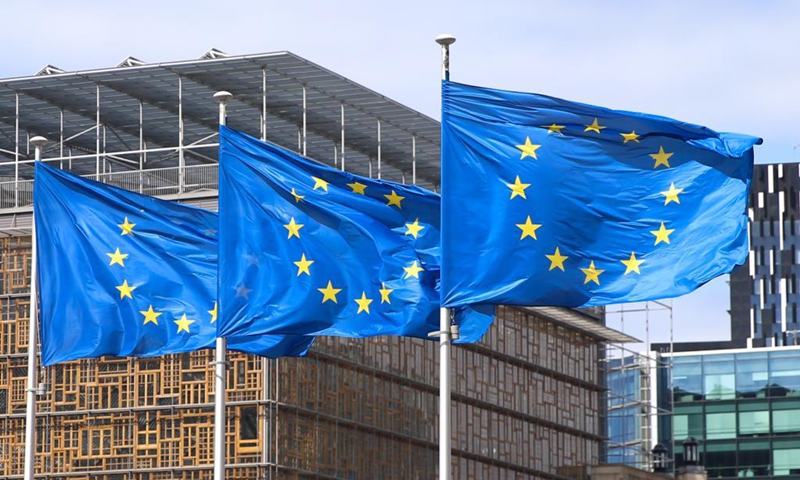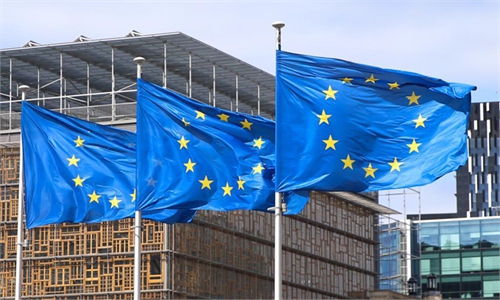EU seeks to restore LatAm ties during summit; attitude on China ‘a test of strategic autonomy’

Flags of the European Union fly outside the EU headquarters in Brussels, Belgium, May 21, 2021. The European Union (EU) recommended on Thursday to open its external borders to non-essential travel into the bloc if travellers have been fully vaccinated against COVID-19. (Xinhua/Zheng Huansong)
Over 50 leaders from European, Latin American and the Caribbean nations arrived in Brussels on Monday for their first EU-CELAC (Community of Latin American and Caribbean States) summit in eight years. Some Western media viewed EU's attempt of rebooting its long-neglected ties with Latin America relations as a way to offset China's influence in the region, or at least reduce dependence on China and Russia.
Chinese experts see the two-day summit more of "a test of the EU's strategic autonomy," given Europe's divergences with CELAC in various fields and Latin America's long history of close ties with China. If EU seeks to coordinate with the US' strategy to drag the CELAC members into camp confrontation instead of emphasizing issues of development, Brussels will not win the respect and support of the countries of the Global South.
According to the European Council website, the major agenda of the summit includes trade, investment and climate change, as well as "peace and stability." According to European media, Brussels wants to secure Latin American and Caribbean states as potential suppliers of raw materials and energy as well as target markets and partners in the fight against climate change
Before the summit, Latin American nations have expressed concern that the initial summit agenda appeared tailored to "Old World interests" as poverty and inequality was not given enough attention, according to the Financial Times, suggesting that Latin American nations are not satisfied with EU's "arrogance," as a sudden wooing may have the intention of "projecting power."
The meeting of Latin American nations, which are seeking to maintain a neutral position on the Russia-Ukraine conflict, sought the removal of wording from a draft text condemning Russia, and tried to add a demand for reparations for the transatlantic slave trade before the summit, the Financial Times reported.
The breakthrough in the EU-Mercosur trade agreement is also at a low expectation, after Brazil's President Lula da Silva rejected Europe's environmental demands. The pact was signed in 2019 after two decades of negotiations but has not been ratified due to EU's concern over accelerating rates of deforestation
Li Haidong, a professor at the China Foreign Affairs University, told the Global Times on Monday that unlike China, which has been committed to exchanges with other developing countries in the past decades, Western countries have not paid much attention to the Global South over an extended period, so the relations between the EU and Latin America have been floating for a long time.
According to Li, the EU's pursuit of Latin America not only aims to win over Global South in line with the global strategic adjustment of the US, but also hopes to revive as a real strong and respectful force in the changing global strategic pattern. And it can be expected that the EU will most likely seeking to enhance ties with other influential international organizations in the Global South community like the African Union.
In addition to the strategic dimension, analysts pointed out that there is urgent need to forge relations between the EU and CELAC which are economically mutually beneficial. Without a pattern of economic reciprocity, the EU's strategic aspirations are unlikely to gain the support of CELAC members and the rest of the Global South.
Despite the EU holding the intention of acting as a "counter-balance" to Beijing, according to the Reuters, the problem is that economic reciprocity cannot be shaped in the short term.
During the Latin America visit in June, European Commission President Von der Leyen expressed willingness to seal the EU-Mercosur trade. She has also raised the EU's loans from €6bn to €10bn for 2021-2027, which is still far less than the €150bn it offers to Africa, according to the Financial Times.
There have been frequent interactions between China and Latin America in 2023, including President Lula's visit to China and the establishment of diplomatic relations between China and Honduras.
Since 2012, China has maintained its position as Latin America's second-largest trading partner. The total trade volume between China and Latin America exceeded $450 billion for the first time in 2021 and reached a new high of $485.79 billion in 2022, an increase of more than 7 percent year on year.
China does not oppose the development of mutually beneficial economic relations between countries, and would welcome seeing the EU keep its distance from the US strategy in its relations with the countries of the Global South, especially CELAC members, Li said.
"The EU's pursuit of closer ties with CELAC will be a test of its sense and action of strategic autonomy," Li said. "It's believed that the vast majority of developing countries including CELAC hope to see more sense of strategic autonomy and action from the EU, rather than the one creating confrontation worldwide following the US."


